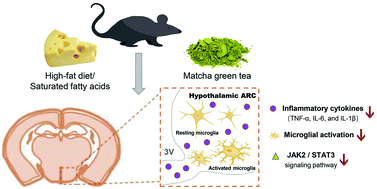Matcha green tea prevents obesity-induced hypothalamic inflammation via suppressing the JAK2/STAT3 signaling pathway
Abstract
Obesity is an increasingly severe global health problem, leading to chronic inflammation and metabolic disorders in both peripheral tissues and the central nervous system. Matcha is a powdered green tea, and it is very popular in recent years as a beverage and food additive. Matcha green tea has been reported to have outstanding potential in regulating obesity-related metabolic syndrome. However, there are few studies on the regulation mechanism of matcha green tea on the central nervous system. In this study, we established a high-fat diet-induced obese mouse model. The results showed that dietary supplementation with matcha could effectively inhibit the weight gain, fat accumulation, glycemia and lipidemia increase, and excessive activation of microglia in the arcuate nucleus of the hypothalamus. Furthermore, we used different concentrations (100%, 80%, 60%, 40%, and 20%, v/v) of ethanol solution to prepare matcha ethanol extracts, and investigated their effects on palmitic acid-induced inflammation of microglial BV-2 cells. The results showed that matcha ethanol extracts could significantly reduce the release of inflammatory cytokines and the expression and phosphorylation of JAK2 and STAT3.



 Please wait while we load your content...
Please wait while we load your content...